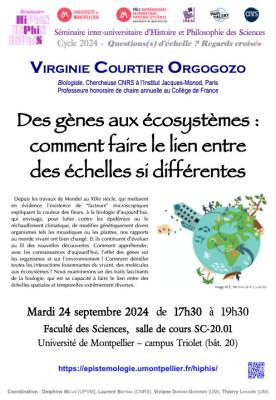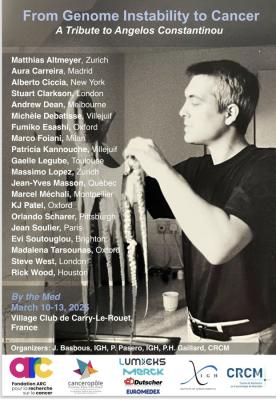Speaker:
Jacques DROUIN (Institut de recherches cliniques de Montréal)
Genopolys Amphitheatre
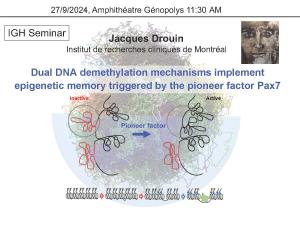
Dual DNA demethylation mechanisms implement epigenetic memory triggered by the pioneer factor Pax7
Contact IGH Giacomo CAVALLI
Chromatin and cell biology
Speaker:
Virginie Courtier-Orgogozo
IGH seminar room
Evolution of Drosophila glue, a promising system for biomimetic applicationsVirginie Courtier-Orgogozo is a research director at the CNRS, she leads a team at the Institut Jacques Monod in Paris (https://courtier.ijm.fr/), she is an invited professor at the Collège de France (https://www.college-de-france.fr/fr/chaire/virginie-courtier-orgogozo-biodiversite-et-ecosystemes-chaire-annuelle/)
Contact IGH Isabelle BUSSEAU
Speaker:
Nick Gibert (Medical Research Council Human Genetics Unit at the University of Edinburgh)
Genopolys
Regulation of large-scale chromatin architecture in human cells
Nick started his career as a PhD student in the biochemistry department at Edinburgh University, and continued his training as a postdoc with Professor Wendy Bickmore. He started his lab in the Edinburgh Cancer Research Centre in 2006 with a fellowship from the Wellcome Trust and moved to the Human Genetics Unit in 2012 funded by an MRC Senior Fellowship. Nick is currently an MRC Investigator and holds a Wellcome Investigator award.
Contact IGH Severine CHAMBEYRON
You must log in to access IGH staff information
Speaker:
Wei Xie (Tsinghua University, Beijing)
Genopolys Amphitheatre
Decoding the transcription circuitry in early mammalian development
Contact IGH Bernard DE MASSY
Meiosis and recombination
Speaker:
Pengyi YANG (University of Sydney, Australia)
IGH seminar room
Computational methods for stem cell biology and engineeringComputational methods are essential for characterising molecular programs that control cell-identity and stem cell-fate decisions. In this seminar, I will present our research on developing and applying computational methods for studying stem cells and stem cell-derived organoids. This will be followed by some initial results from using this knowledge and methodologies for cellular conversion and cell-fate engineering, a key foundation for tissue engineering, disease modelling, and regenerative medicine.
Contact IGH Andrew OLDFIELD
Biology of distal regulatory elements
Speaker:
Carissa CHEN (University of Sydney, Australia)
IGH seminar room
Computational systems approaches to spatial and multi-omics analysis of tissues and organoid modelsDefining the molecular networks orchestrating human brain formation is crucial for understanding neurodevelopment and neurological disorders. In the first part of my talk, I will present my research work on elucidating the molecular programs that drive this highly dynamic process by reconstructing molecular networks that control human cerebral organoids formation using trans-omics data. Next, I will focus on spatial transcriptomics data analysis and present our findings on comparing methods for detecting...
Contact IGH Andrew OLDFIELD
Biology of distal regulatory elements
Speaker:
Thomas Surrey (CRG, Barcelona, Spain)
Genopolys amphitheater
In vitro reconstitutions reveal mechanisms of microtubule nucleation and organization during mitosis
Contact IGH Krzysztof ROGOWSKI
Speaker:
Pr. Didier TRONO (Ecole Polytechnique Fédérale de Lausanne)
IGH seminar room
KRAB zinc finger proteins and genome homeostasis
Contact IGH Monsef BENKIRANE
Laboratory of Molecular Virology
Speaker:
Sonia Garel (IBENS, ENS, Paris, France)
Genopolys amphitheater
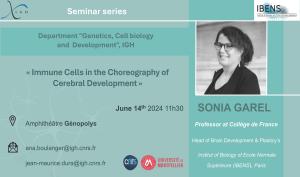
Immune cells in the choreography of cerebral developmentNeurobiologist Sonia GAREL, Professor at the Collège de France and Member of the Academy of Sciences, has led the « Brain Development and Plasticity team » at the ENS Institute of Biology (IBENS) since 2008. Sonia Garel is a pioneer in the study of the mechanisms that control the assembly of forebrain neural circuits during embryogenesis and postnatal development. Her fascinating research shows that brain activity is regulated by immune cells, called “microglia” that play a key role in neurodegenerative...
Contact IGH Jean-Maurice DURA
Speaker:
John Diffley (Crick Institute, Londres)
Genopolys Amphitheatre
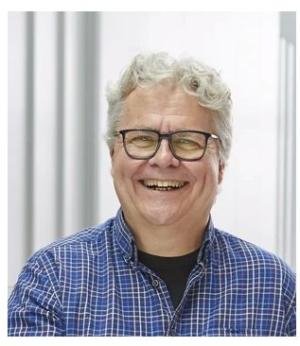
DNA Replication Forks and the DNA Damage CheckpointOn Tuesday, June 4th, Genopolys Amphitheater, at 11h30, John Diffley (Crick Institute, London) will give an exciting seminar on DNA damage and replication titled “DNA Replication Forks and the DNA Damage Checkpoint.” John Diffley, the Associate Director of the Francis Crick Institute, London, is a pioneer in the field of DNA replication and DNA damage. His groundbreaking research involves characterizing the mechanisms of DNA replication and has provided unparalleled insights into the initiation...
Contact IGH Marcel MECHALI
Replication and Genome Dynamics

